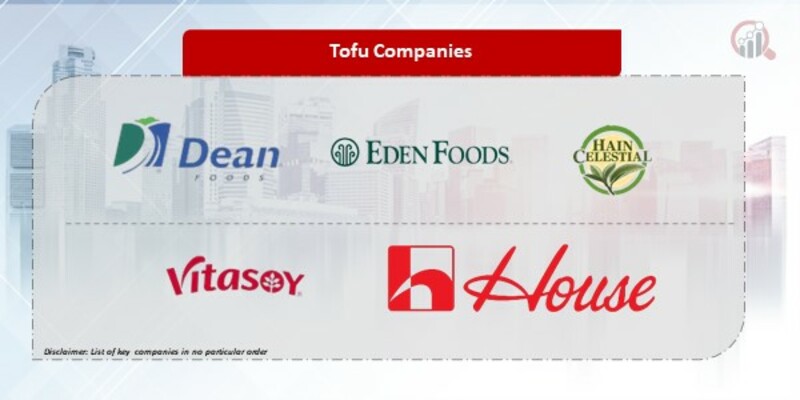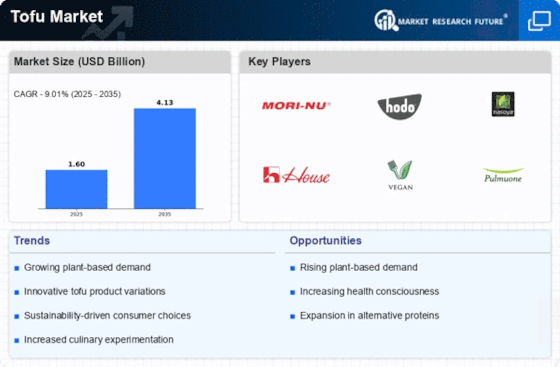Top Industry Leaders in the Tofu Market

The competitive landscape of the tofu market is characterized by the presence of several key players vying for market share. Prominent companies include
- Dean Foods (US)
- Kikkoman Corporation (Japan)
- Eden Foods Inc (US)
- Vitasoy International Holdings (US)
- House Foods Group Inc (Japan)
- Bell Food Group (Switzerland)
- The Nisshin Oillio Group Ltd. (Japan)
- Pulmuone Co. Ltd (South Korea)
- Hain Celestial Group (US)
- Moringa & Co (France)
Strategies Adopted:
In terms of strategies, many leading companies focus on product innovation and diversification to stay competitive. Hain Celestial Group, for instance, consistently introduces new tofu variants catering to different taste preferences and dietary needs. Pulmuone Co. Ltd. has adopted a global expansion strategy, entering new markets to broaden its customer base. Vitasoy International Holdings Ltd. emphasizes sustainability, aligning its tofu production with eco-friendly practices.
Market Share Analysis Factors:
Market share analysis is influenced by factors such as product quality, brand recognition, distribution channels, and pricing. Established players leverage their strong brand image to gain consumer trust, while competitive pricing and effective distribution networks enable market penetration. In this dynamic landscape, newer entrants face the challenge of establishing brand credibility and differentiating their products.
New & Emerging Companies:
Several new and emerging companies have entered the tofu market, aiming to capture a share of the growing demand. These include startups like Tofurky, Beyond Meat, and Oatly AB, which have gained traction by offering innovative plant-based products beyond traditional tofu. These companies often focus on marketing their products as not just alternatives but as superior options, appealing to health-conscious and environmentally-aware consumers.
Industry Trends:
In terms of industry news and current company performance, there is a noticeable shift towards clean labeling and transparent sourcing. Consumers are increasingly seeking tofu products made from non-GMO soybeans and free from artificial additives. Companies that align with these preferences gain a competitive edge. Additionally, partnerships and collaborations between tofu manufacturers and retailers are becoming more prevalent to enhance product visibility and availability.
Investment trends in the tofu market reflect the growing interest from venture capitalists and private equity firms. Investors recognize the potential for substantial returns in the plant-based protein sector. As consumer preferences evolve, capital is flowing into companies focused on research and development, production scalability, and market expansion.
Competitive Scenario:
The overall competitive scenario is dynamic, with players adapting to changing consumer preferences and market trends. The global shift towards plant-based diets and increased awareness of health and sustainability contribute to the tofu market's competitiveness. Market leaders continuously invest in research to improve product quality and expand their portfolios.
Recent Development
In terms of recent developments, there has been a notable increase in mergers and acquisitions within the tofu market. Established companies are acquiring smaller players to strengthen their market presence and diversify their product offerings. These strategic moves aim to consolidate resources and expertise to navigate the evolving landscape effectively.












